OCC-WCC 2024 | What we see today, what we can do tomorrow - global cardiology giants gather in Shanghai to unfold the future of heart health
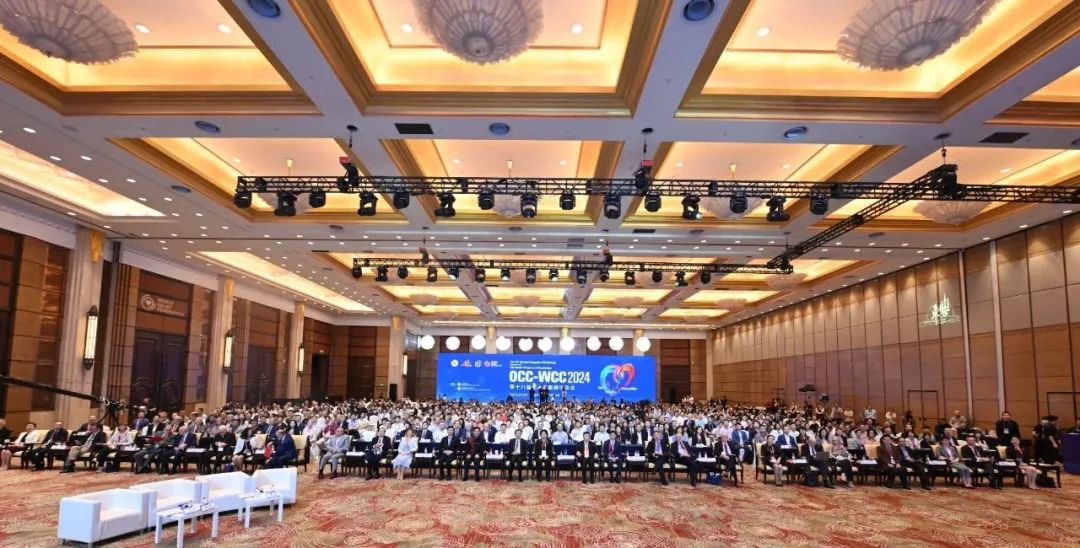
Foreword
"From the moment humans look up at the starry sky, they are not far from unlocking the mysteries of the universe." Liu Cixin wrote in "The Three-Body".
Every step forward for humans starts with imagination and exploration. Therefore, from the moment medical scientists set their sights on the starry sky of the metaverse, the vision of realizing the medical metaverse is no longer out of reach.
8:00 a.m. on June 28, 2024 , cardiology giants from all over the world gathered at the Shanghai International Convention Center to witness the opening of the 18th Oriental Congress of Cardiology(OCC 2024) and the World Congress of Cardiology (WCC 2024) .
01 Opening Prologue: What we see today, what we can do tomorrow
Professor Ge Junbo first pointed out that the incidence and mortality of cardiovascular diseases in China are still on the rise. From a global perspective, the prevention and control of cardiovascular diseases is still severe. Perhaps we should break through the boundaries of disciplines and re-examine cardiovascular diseases and atherosclerosis from a higher level. Clinically, many patients often have cerebrovascular diseases and peripheral vascular diseases, which manifest as systemic atherosclerosis in addition to cardiovascular disease. Based on clinical observations, Professor Ge Junbo, together with Professor Wang Yongjun and others, proposed the concept of panvascular disease in China in 2015, hoping to prevent, treat and manage such diseases as a whole. It take a part for the whole if physicians only start from a single specialist perspective. And there will be deviations in the understanding of atherosclerosis or panvascular disease.
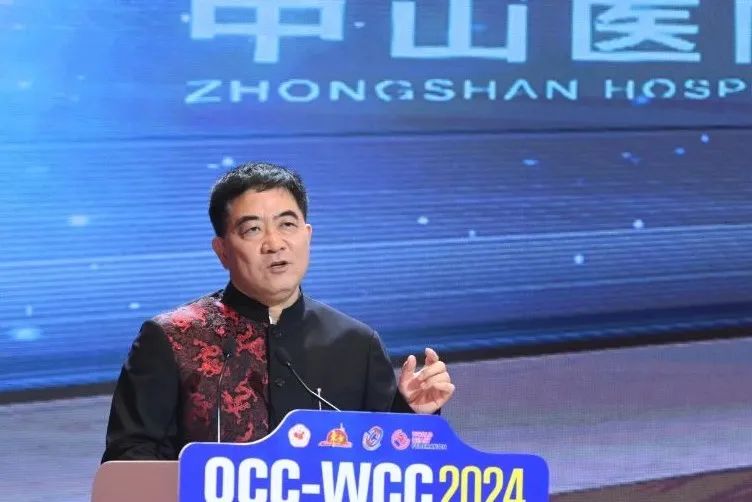
Panvascular diseases affect the whole body. If more effective intervention and management are to be carried out, a more efficient and accurate platform is needed to connect patients and doctors. The framework of artificial intelligence plus metaverse can undoubtedly meet this need. Professor Ge Junbo vividly demonstrated a real case. The AI model showed a high prediction value as its probability of hypertrophic cardiomyopathy was as high as 0.95, and subsequent examinations also verified this conclusion. Regarding the application of such models, Professor Ge Junbo invited Professor Thomas Gaziano, Chairman of the World Heart Federation Scientific Committee and OCC-WCC Academic Chairman , and Professor Christopher Kramer, Vice Chairman of the American College of Cardiology, to share their views.
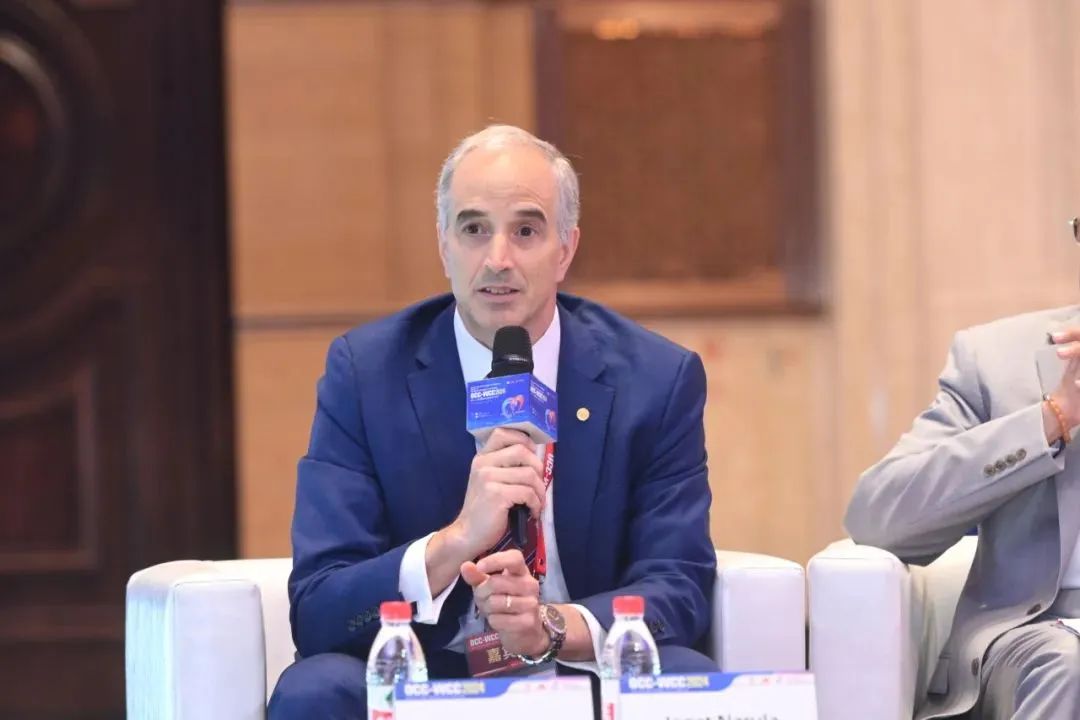
Thomas Gaziano believes that the Metaverse can allow excellent doctors to serve more patients. In the Metaverse, the concept of mutual "connection" brings together strength. The tie he wore today was a gift just given to him by the China Cardiovascular Association(CCA). The English word "tie" also means "connection". It is this mutual connection and cooperation that allows us to face and solve current problems.

Christopher Kramer pointed out that hypertrophic cardiomyopathy is currently underdiagnosed. The emergence of AI technology has undoubtedly greatly improved the diagnostic efficiency and accuracy of hypertrophic cardiomyopathy, especially in cardiac imaging. Professor Christopher Kramer introduced a technology developed by his team that combines AI technology to identify cardiac scars without the need for MRI contrast agents, providing a new opportunity for the diagnosis of hypertrophic cardiomyopathy.
Professor Ge Junbo continued to wander in the Metaverse, introducing that the world's first photon CT was recently put into use in Ruijin Hospital affiliated to Shanghai Jiaotong University School of Medicine. It can not only measure the degree of coronary artery stenosis and evaluate the nature of coronary plaques, but also observe whether the plaques have inflammatory reactions, making a more accurate assessment of the lesions. Combined with the Metaverse, how will this technology change the way doctors diagnose and treat diseases?
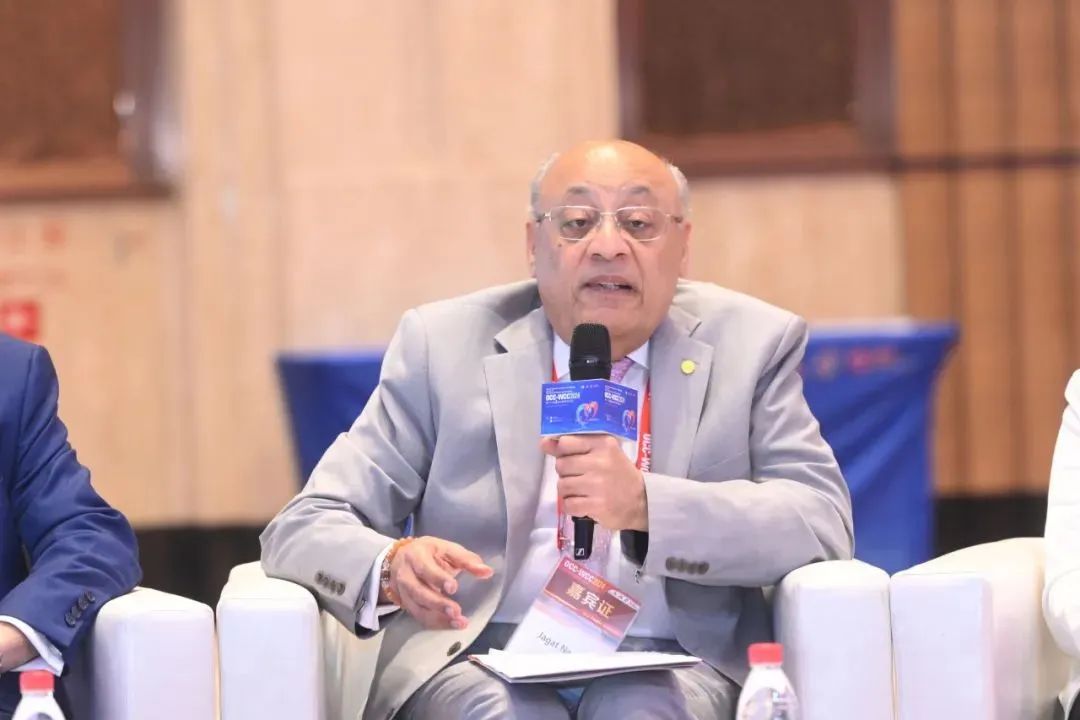
Jagat Narula, the president elected of the World Heart Federation, said that the diagnosis of diseases and the management of patients need to be more sophisticated. If the metaverse can provide more detailed information, perhaps we can intervene in the lesions accurately, let patients know whether they can run or walk now, and what specific healthy foods to eat. The metaverse has great potential to help us achieve this goal.
Three weeks ago, Professor Ge Junbo used domestic interventional surgery robots and 5G technology to complete PCI interventional treatment for a patient 5,200 kilometers away. Faced with more complex interventional treatments for structural heart disease, can Metaverse continue to play an ideal role?
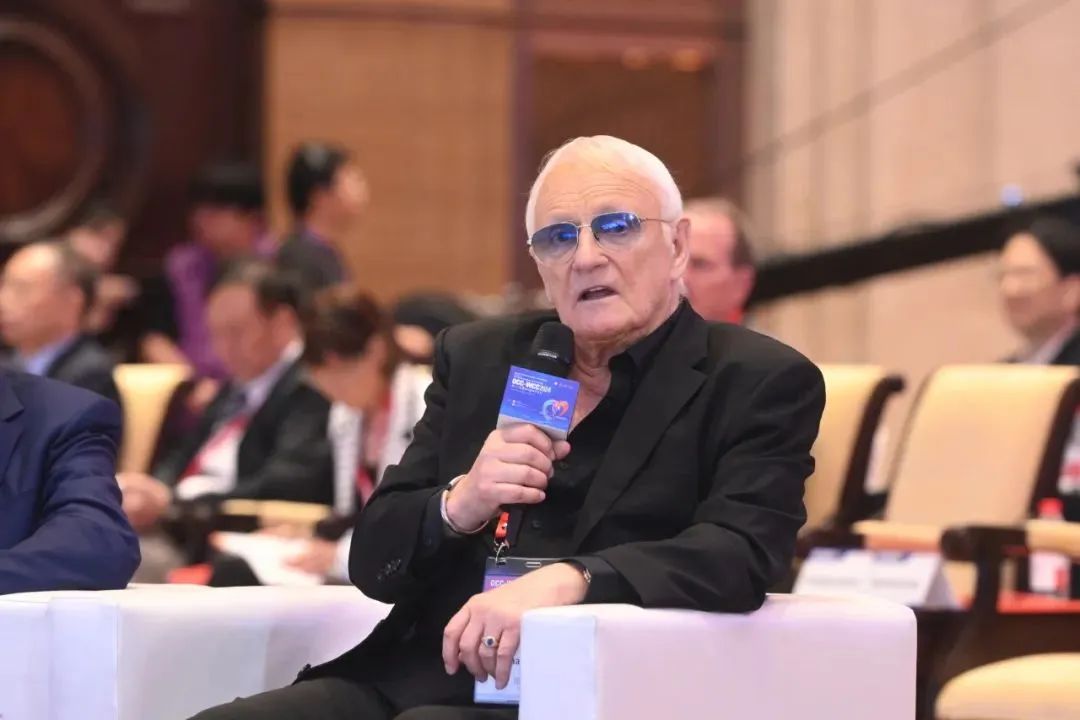
Eberhard Grube of the Center for Innovative Interventional Cardiology at the University Hospital of Bonn, Germany, recalled that he had an in-depth discussion with Professor Ge Junbo on interventional treatment of structural heart disease many years ago. At that time, there were very few cardiovascular physicians engaged in this field. Today, interventional treatment of structural heart disease has become a hot topic in the cardiovascular field. However, Professor Eberhard Grube pointed out a problem. Choosing interventional treatment means that the disease is not under control in the early stages. Perhaps the metaverse can bring about a change in the medical model. By conducting risk assessment and prompts early, we can truly prevent problems before they happen.
The basic concepts and related technologies of panvascular diseases and the Metaverse have been fully presented. The next step is for Professor Ge Junbo to show more practical application scenarios in the Metaverse in real time! A young female patient from Nanjing experienced palpitations and chest tightness. Based on the patient's symptoms and the parameters provided by the smart home, when AI comprehensively assessed that the patient needed medical treatment, Professor Ge Junbo took out the latest AR+VR head-mounted mixed reality device and entered the virtual clinic to diagnose the patient remotely. Professor Ge asked: Will the Metaverse bring fundamental changes to the medical model?
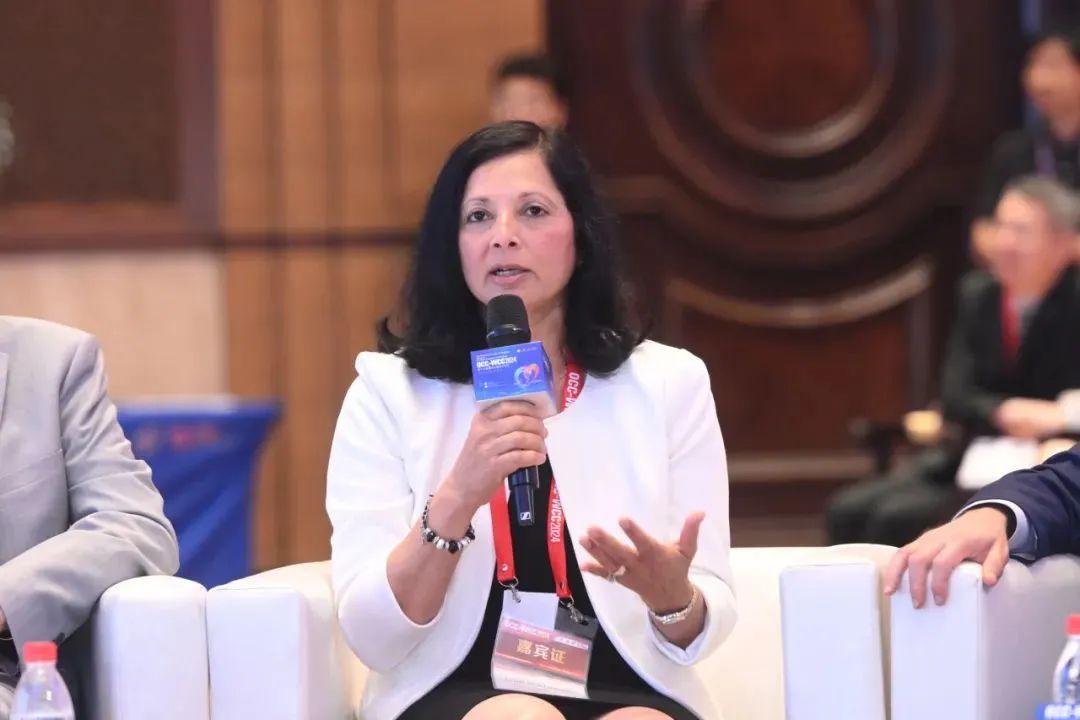
Dipti Itchhaporia, former president of the American College of Cardiology and director of the World Heart Federation, pointed out that although great progress has been made in the diagnosis and treatment of cardiovascular diseases and therapeutic drugs in the past 70 years, the way of providing care or patient management is almost the same as 70 years ago. The emergence of Metaverse enables us to provide high-quality care and management to more patients, and different methods and models can be adopted according to needs, and the accessibility to remote areas is also higher. Professor Dipti emphasized that this is not just a change in concept or mentality, but a subversive process. Today 's opening ceremony of OCC-WCC 2024 reflects this change. As Professor Ge Junbo proposed, the concept of panvascular disease is to regard the patient as a whole, and prevent, diagnose and manage the disease as a whole. Metaverse will undoubtedly gradually realize this vision. Professor Ge Junbo and five international cardiology experts jointly called for cardiovascular physicians to actively embrace the future, embrace the benefits brought by technology, and provide better treatment and management for patients.
02 Opening Remarks : Eighteen Years Passed in the Flick of a Fingertip
After the opening prologue, it was the enthusiastic opening ceremony. Guests attending the opening ceremony included: Professor Wu Jinglei, Vice Chairman of Shanghai Association for Science and Technology and President of Shanghai Medical Association; Honorary Chairman of the Conference, Professor Han Yaling, Academician of the Chinese Academy of Engineering, Chairman of the Chinese Society of Cardiology; Honorary Chairman of the Conference, Professor Zhang Yun, Academician of the Chinese Academy of Engineering, Vice Chairman of the Asia-Pacific Echocardiography Association; Honorary Chairman of the Conference, Professor Chen Yihan, Academician of the Chinese Academy of Sciences, Vice Chairman of the Shanghai Medical Association; Honorary Chairman of the Conference, Professor Wang Jianan, Academician of the Chinese Academy of Sciences, Vice Chairman of the Zhejiang Medical Association; Professor Tan Ming, Executive Vice Chairman of the Shanghai Medical Association; Chairman of the 9th Committee of the Chinese Society of Cardiology, Professor Huo Yong of Peking University First Hospital; Incoming Chairman of the Chinese Society of Cardiology, Professor Ma Changsheng of Beijing Anzhen Hospital Affiliated to Capital Medical University; and Chairman of the Conference, Professor Ge Junbo, Academician of the Chinese Academy of Sciences, Chairman of the Cardiovascular Physician Branch of the Chinese Medical Doctor Association, and Vice Chairman of the Shanghai Medical Association.
The OCC and WCC were held at the same time, and many overseas experts attended the opening ceremony, including Professor Daniel Piñeiro, current president of the World Heart Federation; Professor Jagat Narula, president-elect of the World Heart Federation; Professor Thomas Gaziano, chairman of the World Heart Federation Scientific Committee and academic chairman of OCC-WCC; Professor Dipti Itchhaporia, former president of the American College of Cardiology and director of the World Heart Federation; Professor Richard Chazai, former president of the American College of Cardiology; Professor Cathleen Dalton Biga, president of the American College of Cardiology; Professor Christopher Kramer, vice president of the American College of Cardiology; Professor Filippo Crea, editor-in-chief of the European Heart Journal; Professor Joseph Hill, editor-in-chief of Circulation; Professor Eberhard Grube, Center for Innovative Interventional Cardiology, University Hospital Bonn, Germany; Professor Lin Yanling, fellow of the Royal Australian College of Medicine and Singapore National Heart Center; and Professor Jiang Leng, founding president of the Chinese American Heart Association and non-invasive cardiology department of Massachusetts Medical Center. In addition, experts from more than 30 countries and regions, including members of the World Heart Federation Board of Directors and committees, members of international organizations and international societies/associations, standing committee members and members of the Chinese Society of Cardiology, and members of the Shanghai Medical Association's Cardiovascular Disease Branch, witnessed the wonderful opening moment together.
Friends from all over the world gathered together to open up a new journey for OCC
Professor Ge Junbo, on behalf of the organizing committee of the conference, delivered a welcome speech to all the friends who came from afar. Professor Ge first quoted Confucius' famous saying: "Isn't it a pleasure to have friends coming from afar?" The philosophical words of the ancient sages have come to today across 2,500 years. Even if they are expressed in English, the joy of gathering with fellow practitioners still resonates with the ancients. The 18 years of growth of the Oriental Association are also the 18 years of rapid development of Chinese cardiology. We are fortunate to be in such an era and have devoted ourselves to the cause of cardiovascular disease prevention and treatment, and have achieved many remarkable results. This year, OCC and WCC will be held at the same time. Under the concept of "open, creation and cooperative", OCC will contribute high-tech, high-efficiency and high-quality new quality productivity to the development of the discipline with global cardiovascular colleagues with a more open attitude, a more innovative pattern and broader cooperation opportunities, and make greater achievements for the heart health of China and even the world.
Professor Han Yaling delivered a speech on behalf of the Chinese Society of Cardiology. Professor Han Yaling pointed out that the prevalence of cardiovascular disease in China is still on the rise, and improving the level of cardiovascular disease prevention and treatment plays a very important role in building a healthy China. Under the careful organization of Professor Ge Junbo, the Oriental Congress of Cardiology fully discussed and exchanged new technologies, new concepts, new progress, and new equipment in a rich and diverse form. This year, OCC and WCC were held at the same time, which further enhanced academic exchanges at home and abroad. I believe that with the efforts of all cardiovascular disease experts, China's cardiovascular disease prevention and treatment will surely make greater progress.
Professor Daniel Piñeiro delivered a speech on behalf of the World Heart Federation. Professor Daniel pointed out that the World Heart Federation has united cardiovascular societies/associations in more than 120 countries and regions in the hope of uniting to improve health awareness, improve heart health, and reduce the burden of cardiovascular diseases. Cardiovascular diseases are closely related to all aspects of life. We must not only find out these connections and existing problems, but also actively look for solutions. This year's WCC and OCC are held at the same time, which is a model of successful cooperation. It is hoped that with the cooperation and efforts of all parts of the world, the goal of reducing the global burden of cardiovascular diseases by 1/3 by 2030 can be achieved.
Professor Wu Jinglei, on behalf of the Shanghai Medical Association, extended the warmest welcome to cardiovascular experts from all over the world who gathered in Shanghai. He said that in 2007, Professor Ge Junbo initiated the first OCC, which was also the opening work of the "Oriental" series of brand conferences of the Shanghai Medical Association. The 18-year development of the OCC has not only set a benchmark for the "Oriental" series of brand conferences, but also produced many representative original academic achievements. The prevention and control of cardiovascular diseases is still one of the challenges we are facing at present, and the majority of cardiovascular colleagues shoulder an important mission. It is hoped that the OCC will continue to deepen its interactive exchanges with the global academic community and jointly create a new high ground for the prevention and treatment of cardiovascular diseases.
03 Keynote Speech: New Progress and New Thinking
In the keynote speech session, Professor Han Yaling shared the escalation and de-escalation of antiplatelet therapy for coronary heart disease, guiding clinical physicians to make correct decisions; Professor Jagat Narula's speech was titled "Overcoming Coronary Artery Disasters: Shifting the Focus to the Community", emphasizing the important role of the community in the management of cardiovascular diseases; Professor Chen Yihan introduced the traditional theory and new discoveries of the electrocardiographic control system, revealing that in addition to the classical electrocardiographic control system, there is a larger and more comprehensive electrocardiographic control system in the heart; Professor Wang Jianan elaborated on the research progress of tricuspid valve interventional treatment, and the emergence of new devices, new technologies, and new solutions has brought a new look to tricuspid valve interventional treatment; Professor Joseph Hill started from the overall perspective, focusing on the challenges facing cardiology, discussing possible opportunities, and exploring future development directions; Professor Ma Changsheng systematically talked about the controversy in the treatment of atrial fibrillation, such as the differences between screening, guidelines and clinical practice, and shared the latest research progress in the current field of atrial fibrillation.

发表留言
暂无留言
输入您的留言参与专家互动